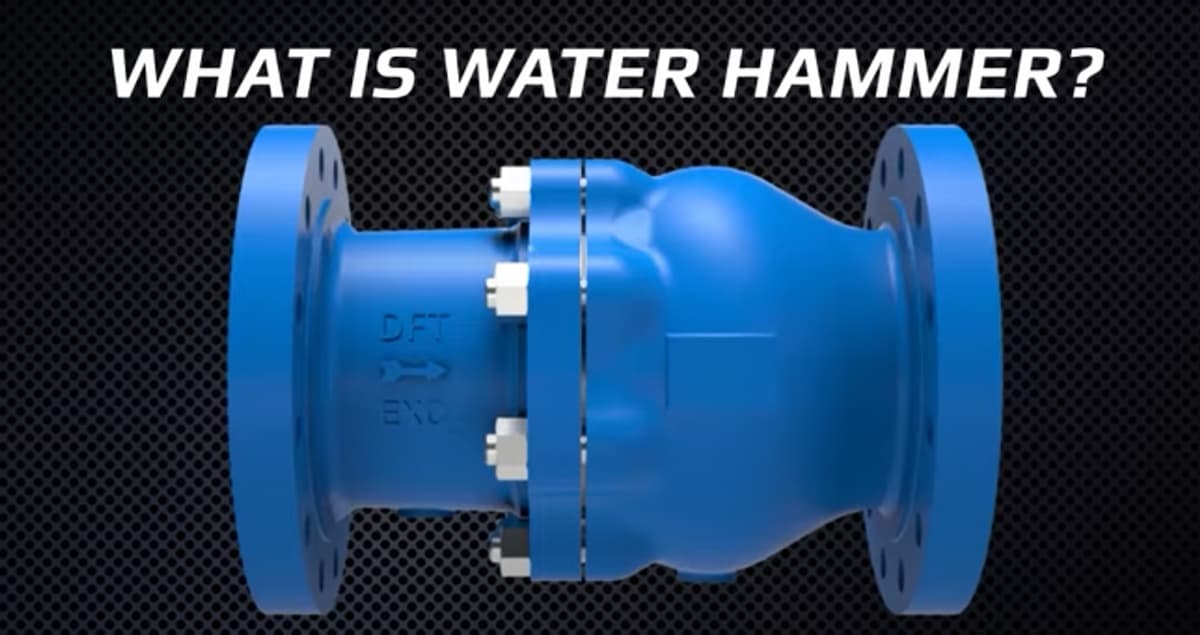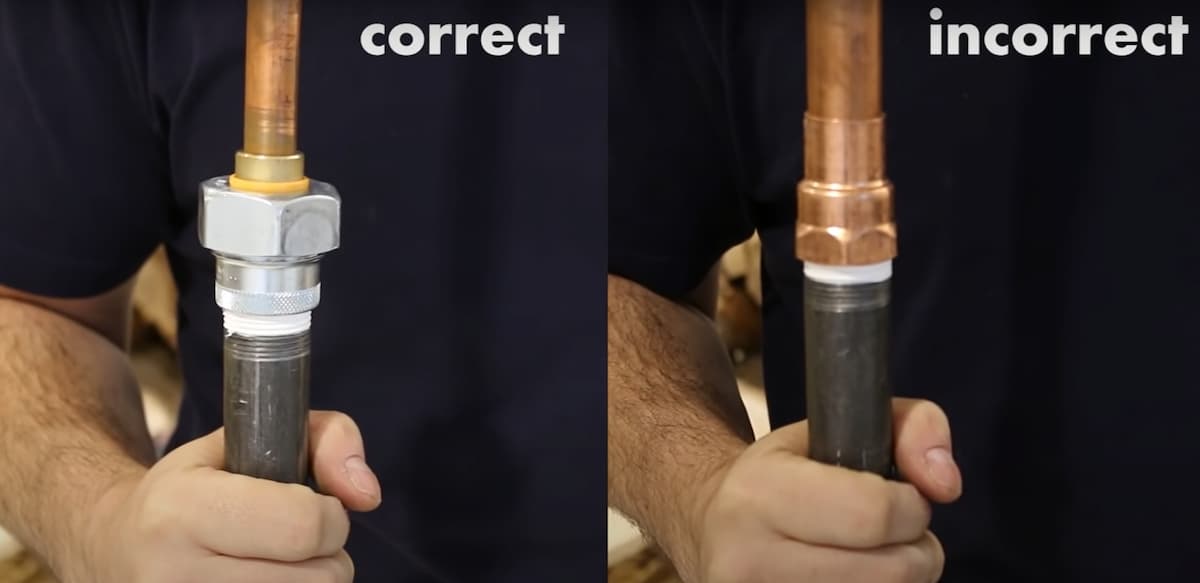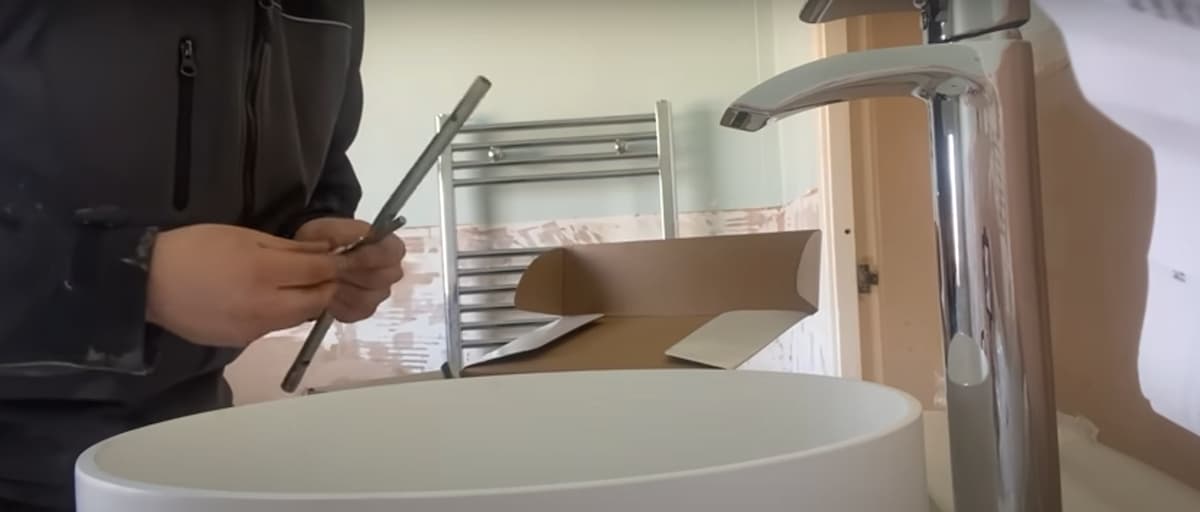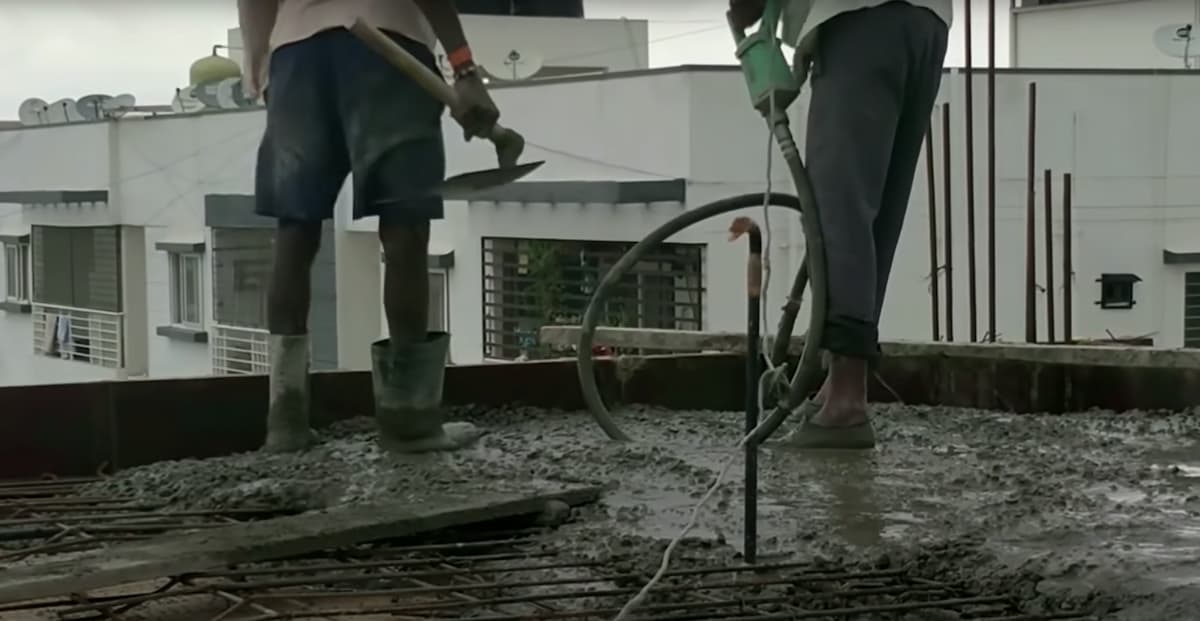
Water hammer is the banging noise produced when a valve abruptly shuts off the water supply. It occurs when water suddenly rushing through a pipe slams into whatever has closed the flow, usually a partially closed valve or section of pipe downstream from it.
Sometimes a water hammer is loud enough to be heard throughout an entire house because the flow velocity managed to change direction suddenly. Bangs happen whenever you turn on a faucet, and they’re particularly noticeable during hot-water usage because heated water can travel more quickly through pipes than cold. The impact of all that fast-moving energy hitting an obstruction can create pressure that’s strong enough to damage moving parts, washing machines or nearby walls, so effects can range from annoying to costly problems.
A few seconds after shutting off your faucet, you may notice a loud banging or clanging noise coming from the water pipes. This is called a water hammer and it can be both annoying and costly, damaging your plumbing in the process if no precautions are taken.
Water Hammer from Pressure Surge
Water hammer is most common when the hot-water tank is too close to the fixtures that feed off of it, like sinks or showers. The heavier water flow created by hotter temps travels through the pipes much more quickly than cold water does, so when you shut off a hot-water fixture, this sloshes into valves and fittings more abruptly than with cold water. Water then slams into whatever has closed off its path, usually a partially closed valve or section of pipe downstream from it.
The pressure created as water slams against the closed valve or pipe can be forceful enough to break fittings loose or even damage pipes. The water hammer effect is one of many issues that could result in a leaky shower head, for example, if it loosens screws holding its connection in place.
How to Avoid a Water Hammer?
The best way to avoid the water hammer is to get your plumbing up off the floor. A hot-water tank that’s located near a shower or sink, where it can be connected with short, stubby pipes, may cause problems in rooms above and below it. You can minimize a water hammer in your home by using longer and more flexible supply lines between fixtures and the main shutoff valve.
A clear sign of a water hammer is an unusually high water bill when there hasn’t been any unusual use of hot water in the house. This could indicate that you have a leak somewhere along with your piping system, or that part of your piping system has broken due to the pressure spike created when turning off a hot-water tap. It’s also possible for the water hammer to cause some valves or faucets to leak.
How Can You Stop the Banging from a Water Hammer?
Once you’ve located the fixture that’s churning out all this noise, your first line of defence is adjusting how tightly it’s closed. Make sure the faucet is completely open, then gradually close it until there isn’t any hissing sound when no hot water is running through it (you don’t want to risk causing a burn). Also, be aware that many modern appliances now feature quarter-turn shutoff mechanisms. While they look sleeker than standard valves and are easier for people with arthritic hands, these sometimes aren’t as forgiving as traditional fixtures. If you have one of these types of faucets in your home, you’ll have to learn how much is too much when it comes to giving the faucet a quarter-turn yourself.
What are Air Chambers?
To further prevent a water hammer, you can install an air chamber. This is a small vessel that’s connected to your home plumbing and holds air under pressure. When the main valve shuts off water flow, the pressurized air behind it cushions any sudden stop inflow and prevents damage from occurring. The air chamber could be installed directly after the fixture it serves, if you don’t have enough distance between them, there’s no need to purchase anything else, simply disconnect and reconnect the supply line until it’s situated correctly.
Air chambers aren’t always available at every hardware store, some plumbers may even laugh at you for asking about one, but if you’re determined to purchase one yourself, there are plenty of sites out there where they are available.
This is where an air chamber can get expensive quickly because it doesn’t just fit on the cold-water shutoff valves, but also one additional shut off valve for each fixture that needs protection against water hammer. It’s best to discuss with your plumber which kind of device may work best for your needs before purchasing anything.
Will an Air Chamber Stop the Water Hammer?
An air chamber is not the only way to stop the water hammer entirely, but they do help reduce noise. These vertical pipes may be a nice addition to your water system. If you decide to purchase an air chamber for your home, simply attach it to your existing plumbing. Air chambers are safer than using insulation because they collect less water if a leaky pipe springs a leak in your ceiling.
If you’re having serious trouble with pipes rattling into each other every time you turn off the tap, then yes, an air chamber is probably something you could consider investing in. Not everyone can afford one though, so instead of buying one online or from the hardware store, you could also use foam insulation between walls and floors or anywhere else where pipes are located beneath flooring or walls. This is a cheaper alternative that’s just as effective as using an air chamber and prevents the water hammer in your pipes from causing damage to your home or appliances.

Water Pressure Limiting Valve
Another way of stopping a water hammer is installing a water pressure limiting valve, but this system requires a professional plumber to install it. The device is set up on the water supply lines, between the main shut off valve and your home’s piping system.
This is a great option if you have an older home and would like to replace your piping systems. It’s also a solution for homes where the connections aren’t easily accessible, such as ones that were built before PVC pipes became common. Shorter branch pipe lengths are also recommended.
A water pressure limiting valve is an automatic device that monitors the amount of stress being put on your piping systems. When it senses any stress, which can be caused by a sudden temperature change or the pressure fluctuating too quickly, this device turns on and regulates the water flow until everything returns to normal.
Problems that can Occur Due to Water Hammer
If you do not have one of these devices installed on your piping system, you could seriously damage or even break pipes, fixtures and appliances. It’s not a good idea to try and fix this problem yourself because you could do more harm than good by trying to modify your home’s existing system. If your plumber does come across any problems with the pressure valves in your house when they’re inspecting it for repairs, then they can risk the water hammer that occurs when you turn off your faucet, too quickly. If it’s done this way, then you’re most likely looking at a very expensive plumber bill for fixing all the damage.
That said, if you already have one of these valves installed on some of your plumbing fixtures but not others, there are still assessing the situation. The pressure wave limiting valves are one of those devices that can be very helpful, but also a little pricey to install. This is a much more permanent fix than using insulation or an air chamber device, which need to be replaced every few years, but you can’t really go wrong with purchasing one of these because they’ll protect your plumbing system in the long term.
If you’d like to install one of these devices, you’ll need to hire a plumber who’s certified and experienced when it comes to working with plumbing systems that are similar to yours. Your plumber may take precise measurements in order to get an accurate price for this device, which is usually installed very close to where your main shut off valve is.
Water Hammer Arrestors
When you install water hammer arrestors, it’s a great option for anyone who can’t afford to replace their entire plumbing system and doesn’t want to break the bank on air chambers and pressure valves. It works like an insurance policy because it may prevent any damage from occurring to your house’s piping system or appliances if you ever experience a water hammer.
Water hammer arrestors are designed to absorb the shockwave that occurs when you shut off your faucet. It only needs to be installed on the main water line and is available at any hardware store or home centre. This device can also be purchased as a combination of two arresters, one on each side of the plumbing fixture.
This is an easy do-it-yourself project if you’re already working with PVC piping in your house and would like to avoid hiring a professional plumber to install expensive pressure valves and air chambers that need regular maintenance and repairs down the road. You may still need to hire a plumber for this though because they’ll measure the space between pipe fittings where it needs to be attached, as well as any other necessary information about the device.
Water Hammer Fluid Flow Problems
If you’re having a problem with a water hammer, then it’s important that you have a plumber inspect your piping system for any damage that might have occurred from the pressure waves. Inexpensive fixes such as insulation and air chambers may not get rid of this problem entirely, but they can help prevent it from getting worse if you do experience a water hammer every once in a while. If these measures don’t work or are too costly for your budget, then it’s time to get out your wallet because installing a pressure limiting valve is going to be the only permanent fix without possibly causing more damage.
Why is Water Hammer a Hydraulic Shock?
When water rushes into your home, there’s a certain amount of resistance that occurs which you might notice in the piping system that causes the water hammer. If they aren’t insulated or air-chambered or if you turn off your faucet too quickly, the resistance may push against any closed valves inside your pipes and cause them to bang together with enough force to break something that’s not supposed to be broken. The hydraulic shock wave can even cause your house to shake, depending on the fluid velocity.
Hydraulic shocks are caused by water pressure when too much is applied all at once. This can happen when someone turns on a hot water tap and cold water immediately runs through it before it heats up (this causes a high-pressure wave). You may also experience hydraulic shock when you turn off your faucet and water has nowhere to go until it all slows down (this causes low pressure).
When too much high water pressure builds up in your piping system, it can cause damage either by cracking something or causing a pipe to burst. And when too much low pressure builds up, the same thing can happen. When there’s no resistance to the water, you might hear a loud bang when someone turns off their faucet which is when the pipe makes an odd sound due to extreme lack of water flow. This can also be dangerous because if you are underneath that section of pipe in the floor when it fails, it could result in injury.
Straight Pipe vs Looped Piping
It’s always better to go with straight piping than looped piping if you’re trying to prevent a water hammer. Pipes that are attached directly to your plumbing devices may allow for faster pressure relief when the faucet is shut off, but it may also cause fluid flow problems which can lead to hydraulic shock waves. On the other hand, looped piping (which is where the pipe turns back on itself) may result in slower pressure relief and less fluid flow problems, however, it may need more air chambers or pressure valves because of this choice.





